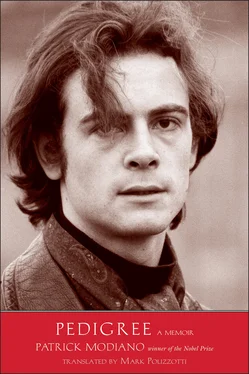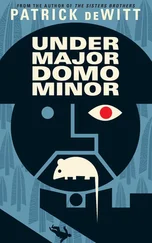The Montcel school catered to the unloved, bastards, lost children. I remember a Brazilian who for a long while occupied the bed next to mine, who’d had no news of his parents for two years, as if they had left him in the checkroom of a forgotten station. Others were already smuggling blue jeans and sneaking past police roadblocks. Two of the students, two brothers, would even stand trial some twenty years later. Gilded youth, for the most part, but the gilding was tarnished, of poor alloy. Most of those fine young lads would have no future.
My readings at the time. Some books left their mark: Fermina Márquez, The Penal Colony, Les Amours jaunes, The Sun Also Rises. In other books, I rediscovered the fantastic character of the streets: Marguerite de la nuit by Pierre Mac Orlan, Rien qu’une femme by Francis Carco, La Rue sans nom by Marcel Aymé. In the college infirmaries, there were still some old novels lying around that had survived the last two wars, and that stood quietly on the shelves for fear someone might haul them down to the basement. I remember reading Bazin’s The Children of Alsace. But mainly, I read the first “Livres de Poche” that had just been published, with their purple cardboard bindings. Good novels and bad, indiscriminately. Many have since gone out of print. Among those books, several titles have retained their aroma: La Rue du Chat-qui-Pêche, La Rose de Bratislava, Marion des neiges.
On Sundays, strolls with my father and one of his cronies of the time, Stioppa. My father saw a lot of him. He wore a monocle and his hair was so thick with pomade that it left a stain when he rested his head against the sofa. He had no discernible profession. He lived in a boardinghouse on Avenue Victor-Hugo. Sometimes Stioppa, my father, and I would go walking in the Bois de Boulogne.
On another Sunday, my father took me to the boat show at the Quai Branly. We met a friend of his from before the war, “Paulo” Guerin. An aged young man wearing a blazer. I don’t remember whether he was also visiting the show or manning a booth there. My father explained that Paulo Guerin never did anything but ride horses, drive around in fancy cars, and seduce the ladies. Let that be a lesson to me: yes, indeed, in life, you have to have your diplomas. That late afternoon, my father seemed pensive, as if he’d just met a ghost. Each time I’ve found myself on the Quai Branly, I’ve thought of this Paulo Guerin and his slightly stocky build, his pasty-looking face under swept-back brown hair. And the question remained forever unanswered: whatever could he have been doing at the boat show that Sunday, without his diplomas?
There was also a certain Charly d’Alton. It was especially with him and his old pal Lucien P. that my father tossed the phone back and forth like a rugby ball. His name reminded me of the Dalton Brothers in the comic books, and later I noticed that it was also the name of a friend of Alfred de Musset’s. And a man my father always called by his surname, Rosen (or Rozen). This Rosen (or Rozen) was the spitting image of the actor David Niven. I seem to recall that during the Spanish Civil War, he enlisted on the side of Franco. He could sit silently on the couch for hours. Even in my father’s absence. Even at night, I imagine. He was part of the furniture.
Sometimes my father came with me on Monday mornings to the Rotonde at the Porte d’Orléans. That’s where I would catch the bus that took me back to school. We got up at six o’clock, and my father used the time before the bus arrived to hold appointments in the cafés around the Porte d’Orléans, lit with neon on those winter mornings when it was still pitch black outside. Hiss of the percolators. The people he saw there were different from the ones he met at the Claridge or the Grand Hôtel. They spoke in low voices. Stall hawkers, men with the ruddy complexion of traveling salesmen or the sly demeanor of provincial clerks. What did he want with them, exactly? They sported rural names like Quintard, Chevreau, Picard …
One Sunday morning, we took a taxi to the Bastille neighborhood. My father had the driver stop about twenty times in front of apartment houses on Boulevard Voltaire, Avenue de la République, Boulevard Richard-Lenoir … Each time, he left an envelope with the concierge. A notice to former shareholders of a defunct company whose stock certificates he had unearthed? Something like the Union Minière Indochinoise? On another Sunday, he dropped off his envelopes along Boulevard Pereire.
Sometimes, on Saturday evenings, we went to visit an elderly couple, the Facons, who lived in a minuscule apartment on Rue du Ruisseau, behind Montmartre. On the wall of the tiny living room, exhibited in a frame, was the military medal M. Facon had been awarded in World War I. He was a former printer who loved literature. He gave me a handsomely bound edition of Saint-Pol Roux’s book of poems La Rose et les épines du chemin. Under what circumstances had my father met him?
I also remember a certain Léon Grunwald. He came to lunch with my father several times a week. Tall, with wavy gray hair, face like a spaniel’s, drooping eyes and shoulders. Much later, I was surprised to find a trace of the man in Jesús Ynfante’s book on the “Broglie Affair”: In 1968, the president of a company called Matesa “was seeking financing to the tune of fifteen to twenty million dollars.” He had got in touch with Léon Grunwald, “who had helped arrange the primary financing to Luxembourg.” A memorandum of understanding was signed by “Jean de Broglie, Raoul de Léon, and Léon Grunwald”; if the loan went through, they stood to earn a commission of five hundred thousand dollars. According to what I read, Grunwald had died in the interim. From exhaustion? It’s true that these kinds of people have demanding jobs and spend many a sleepless night. By day, they schedule countless meetings with one another to try to sign their “memoranda of understanding.”
I would like to breathe purer air, my head is spinning, but still I recall several of my father’s “appointments.” One late morning I had accompanied him to the Champs-Elysées. We were welcomed by a short, bald, very vivacious man, in a cupboard-sized office where we could barely find room to sit. I thought he was one of the seven dwarves. He kept his voice down, as if he wasn’t supposed to be there.
Normally, my father held his “appointments” in the lobby of the Claridge, where he took me on Sundays. One afternoon, I stayed to the side while he conferred in undertones with an Englishman. He tried to grab a sheet of paper the Englishman had just initialed, but the latter snatched it away too quickly. What “memorandum of understanding” could this have been? My father had an office in a large, ochre-colored building at 1 Rue Lord-Byron, where he headed the Société Africaine d’Entreprise, along with a secretary named Lucienne Wattier, a former model whom he addressed with the familiar tu. This is one of my first memories of the Paris streets: walking up Rue Balzac, then turning right onto Rue Lord-Byron. One could also reach this office by entering the Normandie cinema on the Champs-Elysées side and following a tangle of hallways.
On the mantelpiece of my father’s room were several volumes of “maritime law,” which he was studying. Something to do with a cigar-shaped oil tanker he wanted to have built. My father’s Corsican lawyers: Maître Mariani, whom we would visit at home, and Maître Vizzavona. Sunday walks with my father and an Italian engineer, who held a patent for “pressure ovens.” My father became close friends with a certain M. Held, “water diviner,” who always wore a pocket watch on a chain. One evening, on the stairs, my father said something that I didn’t fully grasp at the time — one of the rare instances when he opened up to me: “One should never neglect the little details … Unfortunately, I’ve always neglected the little details.”
Читать дальше












